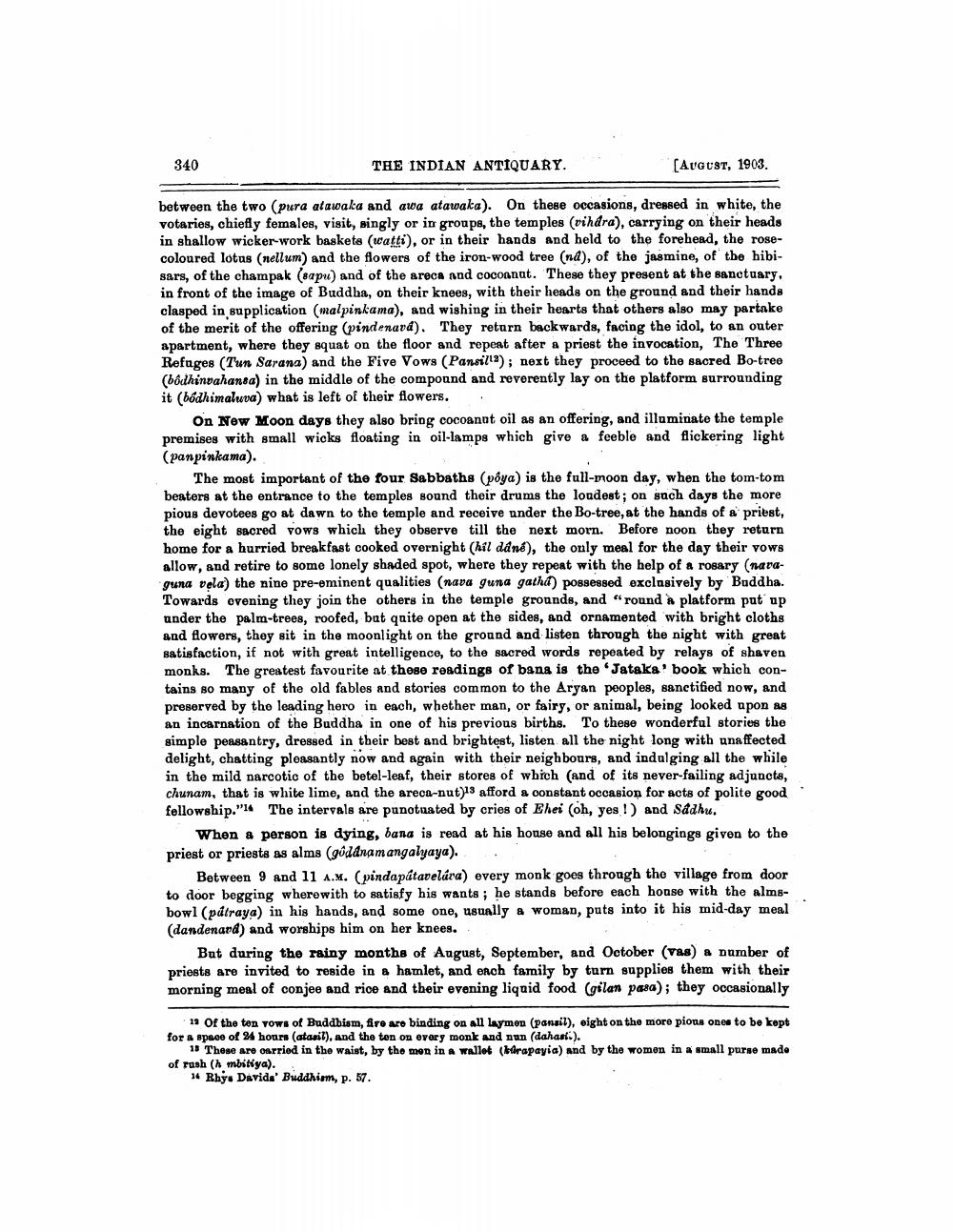________________
340
THE INDIAN ANTIQUARY.
(AUGUST, 1903.
between the two (pura alawaka and awa atawaka). On these occasions, dressed in white, the votaries, chiefly females, visit, singly or in groups, the temples (vihdra), carrying on their heads in shallow wicker-work baskets (watti), or in their hands and held to the forehead, the rosecoloured lotus (nellum) and the flowers of the iron-wood tree (nd), of the jasmine, of the hibisars, of the champak sapu) and of the areca and cocoanat. These they present at the sanctuary, in front of the image of Buddha, on their knees, with their heads on the ground and their hands clasped in supplication (malpinkama), and wishing in their hearts that others also may partake of the merit of the offering (pindenard). They return backwards, facing the idol, to an outer apartment, where they squat on the floor and repeat after a priest the invocation, The Three Refuges (Tun Sarana) and the Five Vows (Pansilla); next they proceed to the sacred Bo-tree (bôdhinvahansa) in the middle of the compound and reverently lay on the platform surrounding it (b6dhimaluwa) what is left of their flowers.
On New Moon days they also bring cocoanot oil as an offering, and illuminate the temple premises with small wicks floating in oil-lamps which give a feeble and flickering light (panpinkama).
The most important of the four Sabbaths (pôya) is the full-moon day, when the tom-tom beaters at the entrance to the temples sound their drums the loudest; on such days the more pious devotees go at dawn to the temple and receive under the Bo-tree, at the hands of a priest, the eight sacred vows which they observe till the next morn. Before noon they return home for a hurried breakfast cooked overnight (hil dané), the only meal for the day their vows allow, and retire to some lonely shaded spot, where they repeat with the help of a rosary (naraguna vela) the nine pre-eminent qualities (nava guna gatha) possessed exclusively by Buddha. Towards ovening they join the others in the temple grounds, and "round a platform put up under the palm-trees, roofed, but quite open at the sides, and ornamented with bright cloths and flowers, they sit in the moonlight on the ground and listen through the night with great satisfaction, if not with great intelligence, to the sacred words repeated by relays of shaven monks. The greatest favourite at these readings of bana is the 'Jataka' book which contains so many of the old fables and stories common to the Aryan peoples, sanctified now, and preserved by the leading hero in each, whether man, or fairy, or animal, being looked upon as an incarnation of the Buddha in one of his previous births. To these wonderful stories the simple peasantry, dressed in their best and brightest, listen all the night long with unaffected delight, chatting pleasantly now and again with their neighbours, and indulging all the while in the mild narcotic of the betel-leaf, their stores of which (and of its never failing adjuncts, chunam, that is white lime, and the areca-nut)is afford a constant occasion for acts of polite good fellowship.". The intervals are punotuated by cries of Ehei (oh, yes!) and sadhu,
When a person is dying, bana is read at his house and all his belongings given to the priest or priesta as alms (goddna mangalyaya). .
Between 9 and 11 A.M. (pindapátarelára) every monk goes through the village from door to door begging wherewith to satisfy his wants; he stands before each house with the almsbowl (pátraya) in his hands, and some one, usually a woman, puts into it his mid-day meal (dandenard) and worships him on her knees.
But during the rainy months of August, September, and October (vas) a number of priests are invited to reside in a hamlet, and each family by turn supplies them with their morning meal of conjee and rice and their evening liquid food (gilan pasa); they occasionally
11 of the ton vows of Buddhism, fire are binding on all laymon (panail), sight on the more pious ones to be kept for a space of 24 hours (atast), and the ten on every monk and nan (dahast.).
10 These are onrried in the waist, by the men in a wallet (brapayia) and by the womon in a small purse made of rash (h mbiliya).
14 Rhy. Davida' Buddhism, p. 57.




